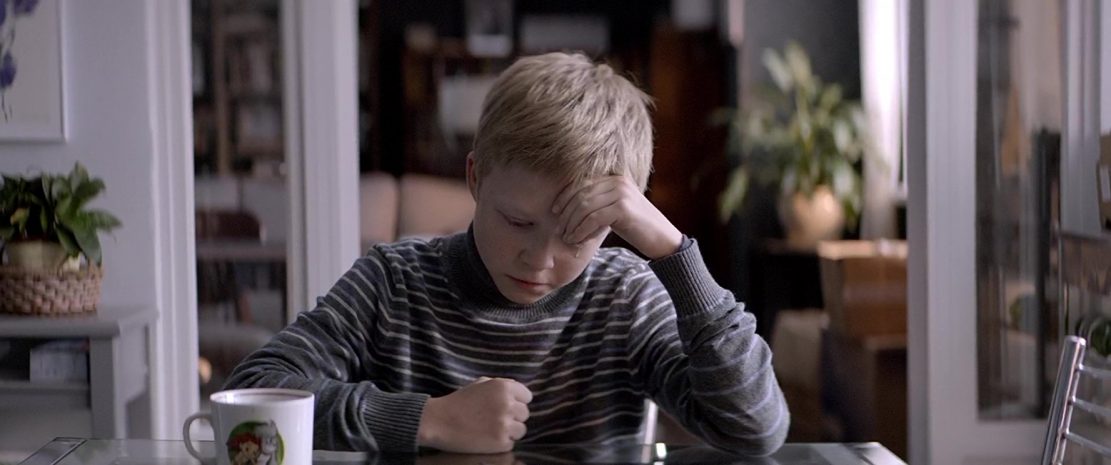| Worth seeing: | as a technically immaculate, emotionally and visually bleak but beautiful study of a loveless world that's easy to admire but hard to love |

| Director: | Andrey Zvyagintsev |
| Featuring: | Aleksey Rozin, Maryana Spivak, Aleksey Fateev, Andris Keiss, Anna Gulyarenko, Artyom Zhigulin, Marina Vasileva, Matvey Novikov, Natalya Potapova, Sergey Badichkin |
| Length: | 127 minutes |
| Certificate: | 15 |
| Country: | Belgium, France, Germany, Russia |
| Released: | 9th February 2018 |
WHAT’S IT ABOUT?
It’s 2012 in Moscow and Boris (Aleksey Rozin) and Zhenya (Maryana Spivak) are a divorcing couple who hate each other even more than they hate the son whose conception forced them to marry in the first place.
Among all the arguments they’re having, while they’re still living under the same roof, is who’ll have the misfortune to end up having custody of Alyosha (Matvey Novikov).
Both parents are already spending most of their time with their prospective new partners, so when their son’s school calls to say he hasn’t turned up for two days, neither has even noticed he’s gone.
Not keen to take time off his highly paid job, Boris tries to persuade Zhenya that the boy is probably already on his way back home, but she’s not leaving it to chance and reports his disappearance to the police.
The police don’t have the resources to look for every runaway, taking a similar line to Boris – he’ll probably come back soon, is their view. They’ll start searching in a few day’s time, but if she wants anything to be done sooner, Zhenya will have to call in a group of search volunteers – so that’s what she does.
The couple who hate each other – and their son – have at least softened on their twelve year old enough to agree to cooperate with each other to try to find him.
But lead after lead come to nothing, there’s no thawing in their relationship and the search is putting pressure on the new lives they’re trying to build.
WHAT’S IT LIKE?
Since his 2003 feature debut The Return, Andrey Zvyagintsev has become one of the most highly regarded Russian film-makers working today, with most of his films garnering recognition at Cannes, the Golden Globes, the Oscars or the London Film Festival, among others.
Loveless is another film whose technical competence and emotional coldness have rattled the awards voters.
But unlike his most recent Leviathan, where his traditional side-swipe at the Russian authorities is subtly nestled in the narrative, it’s a little blunt here; while the plot is unfolding, characters just happen to be watching the news or listening to the radio, with reports talking about what’s going on in Ukraine or other issues sensitive to those who might be antipathetic towards Moscow. It’s specifically set during a period of Russian history that rankles Moscow-sceptics – nothing about the plot itself requires it to begin in 2012.
The story itself touches on issues that Putin’s critics might seize on, but which might be similarly frustrating for people all around the world; the breakdown of relationships, the capitalist drive for high earnings, the drain on police resources.
As the title suggests, there’s not much to warm the heart in this film – a bitter divorce battle, each parent hating their child as much as the other, the glimmer of light of new relationships quickly fading.
From the first frame, the cinematography is striking – contrasts between snow-covered deciduous trees alongside the bold blue waters of a stream running through a lifeless forest; the square, grey concrete jungle of a school that comes to life only when screaming children run for home; the plush, dimly-lit apartments overlooking Moscow’s skyline that wouldn’t look out of place in New York or London; the run-down house on the outskirts of the city; the cavernous office refectory; the dilapidated ruins of a once-grand building, hidden in the woods.
Perhaps more can be learned about society – not just in Russia – from the locations and the way they are shot than from the narrative itself. Not least because the characters themselves aren’t just unhappy, but unlikeable – and the one person whose story we really want to know – how is the young boy coping with the lack of love in his life – is not answered, because the story is told only from the point of view of his parents.
The way the film is pitched – divorcing couple come together to search for their missing son – hints at a degree of resolution but Zvyagintsev’s nihilistic and humorless outlook threatens to leave viewers feeling as empty as the film’s protagonists. This is one of those films that’s easy to admire but hard to love.
